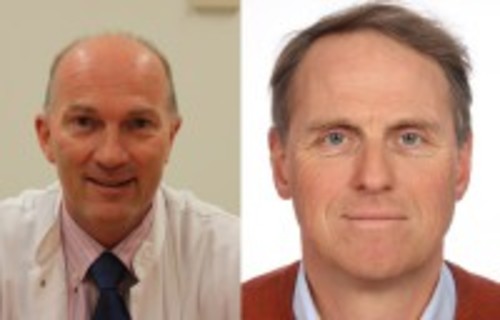We would like to share with readers of the column the launch of a new initiative in the Netherlands that brings together all medical specialities. The new collaboration is an important national actor in relation to the government, public health care and medical community. We feel that this unique collaboration and new initiative will help ensure powerful activities and joined practice for respiratory and all specialities on a national and global level.
The Dutch Association of Physicians in Chest Medicine and Tuberculosis (NVALT) is the national, professional and scientific organisation of specialists in respiratory medicine and tuberculosis. An important new issue in this field is the recent launch of the Dutch Association of Medical Specialists (Federatie Medisch Specialisten: FMS), an overarching national organisation in which all certified scientific associations of medical specialists are represented.
De FMS has 20,000 (!) members, all of them medical specialists. It is the collaborative platform in the field of professional interests, quality policy, training and education, science and innovation. To ensure that we are working towards a common goal, four Boards are formed within this national FMS and this is where the NVALT meets the other scientific organisations of medical specialists at a practical level for sharing policy and vision. The insight of the NVALT leaders at this level will ultimately lead to change in the respiratory field.
The Board of Quality is the task force for evaluation, reflection, accountability, transparency and innovation in specialised medicine, including the respiratory field. Multidisciplinary guidelines are developed to improve quality and efficiency of care and to reduce variations in pulmonary practice.
The Board of Professional Interests covers the area of accessibility of specialised respiratory and oncologic medicine, the position of medical specialists, the conditions of employment and issues of declaration and reimbursement. The implementation of new and expensive drugs e.g. for the treatment of lung cancer, pulmonary fibrosis and severe asthma has much attention.
The Board of Training ensures the tuning of content and structure of the certified training of medical specialists in relation to the need of specialised medicine in the Netherlands. Training e.g. in respiratory medicine demands special skills from the supervising chest physicians and support is given by this platform of societies.
The Board of Research and Innovation has just started in January 2016. A member of the Dutch NRS has joined the executive board of the NVALT and will hold the portfolio of respiratory research at a national level.
Due to the fact that a platform for collaborative research in the pulmonary field was needed the National Respiratory Society (NRS) was set up. The NRS started in 2009 with a mission: “To optimise prevention and treatment of the diseases of the airways and the lungs we want to improve quality and attention for respiratory research and to empower its (inter)national position.” The NRS is a network organisation that brings all relevant parties – researchers, organisers, policymakers, financiers and patients– together and tries to connect them. The main role of the NRS is to initiate, facilitate and to support the field of (transdisciplinary) lung research in the Netherlands. Their main focus is to strengthen collaborative research efforts in the Netherlands and to improve the outlook of affected patients. Research activities are being coordinated by the NRS. In 2016, the NRS will organise for the 8th time the Young Investigator Symposium where young researchers can meet each other and can present their research.
Already for the 6th time in 2016 the Animal symposium will be organised, where basic researchers with different backgrounds, i.e. biologists, pharmacologists, and clinicians meet each other. In April this year a big meeting will be organised for all physicians, patients and researchers being all related to pulmonary diseases. Last year more than 1000 people attended this meeting, which is a another step in developing new collaborative networks including patients and so raising more attention for pulmonary diseases.
The biggest recent effort brought by the NRS was initiating a National Program Lung Research entitled ‘Lifelong Lungs’, to improve collaborative efforts in the Netherlands. It started by identifying 12 pulmonary areas: allergy, asthma, bronchopulmonary dysplasia and primary ciliary dyskinesia, cystic fibrosis (CF), COPD, interstitial lung diseases, infections, intensive care, lung transplantation, lung cancer, pulmonary hypertension and sleep apnoea.
Relevant data were collected and a SWOT analyses was performed. The 12 teams were also asked to identify opportunities for challenging collaborative research with each of the other 11 fields. Afterwards all fields were judged by international experts regarding several research and organisational aspects. A final step was to identify missing links to further improve Dutch lung research. At the end we defined 6 goals for bringing pulmonary research further with the ultimate goal of developing a National Program Lung Research. This was a bottom-up procedure inviting professional/scientific and patient associations, charities, governmental and pharmaceutical bodies, and industrial organisations. A 2 /1/2 days meeting was organised to get an answer to the following questions:
- What are the main questions regarding lung health?
- Which questions can provide solutions for multiple diseases?
- As a consequence, which areas of research should be focussed on in the coming 5-10 years?
Currently we are discussing the results of this meeting with the goal to identify 5 priorities for research in the Netherlands. The leaders of the NRS feel that this project is a key event for the further development of respiratory research in the Netherlands.
About the NVALT and NRS
The NVALT was founded in 1908 and has a long history in the national and international respiratory field. Over 800 Dutch chest physicians enjoy a combined membership of both NVALT or NRS with the ERS. Annual national meetings give us the opportunity to enlarge our boundaries, discuss new developments and share opinions on pulmonary medicine and research.
The ultimate goal of both the NVALT and the NRS is to improve national lung health. The synergistic collaboration ensures true cross-fertilization.





